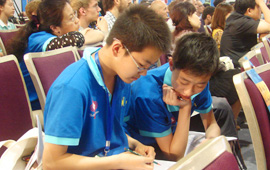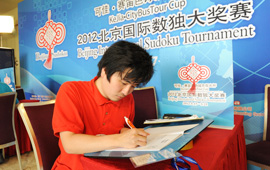|
 |
 |
|
PUZZLED: Two spectators, the young Chinese player Qiu Yanzhe (left) and his partner, try to solve a complicated puzzle in the final match of BIST 2012 (BAI SHI) |
DUEL OF WIT: Japanese player Kota Morinishi participates in the final match of BIST 2012 (BMN) |
According to statistics from Beijing Leisure magazine in issue 19, 2012, more than 300,000 Sudoku games were downloaded by Chinese cellphone users last year.
The game is catching on, especially among young people in China. Of the 14 Chinese Sudoku players at BIST 2012, most were teenage students.
Qiu Yanzhe, a 13-year-old middle school student in Beijing, was the youngest Chinese player. Qiu was satisfied with his second-place tournament finish in the under-18 bracket.
"I did not expect to win a place," Qiu told Beijing Review.
Qiu has been obsessed with Sudoku since 2009. He said he usually plays two or three Sudoku puzzles a day, adding that "many of my classmates also have been fond of this game."
"I have gained more experience with Sudoku through the tournament," Qiu said. "For example, I identified some faults that I often committed. My skills have improved by competing with other top contestants in the game."
Qiu was the youngest member of the Chinese Sudoku team for WSC 2011. Some onlookers thought he could become a world-class Sudoku competitor.
Many Chinese parents took their children to BIST to watch the games and cheer on competitors.
"I want my son to follow his interest in Sudoku, which is quite helpful for his logic and intelligence development," said Gerald Gan to Beijing Review. The father and son came to Beijing from Singapore to participate in the game.
Not only for youngsters, Sudoku is also a healthy activity for elderly people. Scientists say playing Sudoku on a regular basis can help maintain a quick and responsive brain in the elderly, preventing diseases associated with aging such as senile dementia.
Liang Yue, 54, the eldest player in the tournament, has played Sudoku for six years. Liang is a marketing manager at a Beijing company specializing in sports. A longtime player of puzzles, Sudoku soon became Liang's favorite hobby.
"As people do sports for body building, we also need to pay attention to maintaining a healthy brain," Liang said. "For this purpose, Sudoku is an appropriate game for both young and old. I usually spend two hours doing Sudoku exercises every day, which keeps my brain swift and sharp. I can feel the effects."
Although Liang did not make it to the finals this time, he felt good about his performance in the competition. "Well, as they say, it's not the winning but the taking part that counts," he said.
The puzzles used during the tournament also featured unique Chinese designs. Chen Cen, a member of China's team for the WSC 2009 and 2010, served as chief designer of all puzzles for BIST 2012.
Chinese flair
One distinguishing feature of the puzzles was the Clone Sudoku, which was invented by Chen and her team and appeared in the tournament for the first time.
Clone Sudoku is a pair of identical diagrams in which each one has different rules to solve. For example, one puzzle of the Clone Sudoku requests puzzlers to fill odd numbers into the shadow grids, while the other one with the same pattern requests that the numbers of every three shadows should equal 10, said Chen.
"In addition to new puzzles, some Chinese elements, such as Chinese characters and graphs, are used to design the puzzle patterns," Chen said. "Sudoku is a game of numbers, with no relation to the educational level or cultural background of players. Despite various patterns, all of these new puzzles meet international Sudoku game standards."
| 